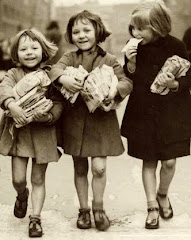Francisco Jiménez’s collection of vignettes from his autobiography, The Circuit, offered a heartfelt and eye-opening look into the harsh lives of migrant workers in southern California. I enjoyed being made aware of a new perspective of life within the United States and I can see where this text would be beneficial in helping to introduce readers to a lifestyle that is not often publicized. Within the text, I enjoyed the persistent force and drive of the Jiménez family as they worked together in their search for a better life.
The very first story within the text follows the small family as they make the treacherous journey from Mexico to the United States. Within the story Roberto mentions that, “Fito told me that people there sweep money off the streets” (3). This common misconception made by immigrants who are swept away by the promise of the “American Dream” is very common in literature that features immigrants from other countries who wish to make their fortune on the gold-lined streets of America. I thought this characterization of the family and their high hopes illustrated this point well. Even though Papa knows that this statement is false, he does tell his two sons, “But it’s true that life is better there” (3). It is a fact, not something up for discussion; it is only Mama who worries about the validity of such high expectations.
The reality of living in California is much different than what the family expects. Jiménez’s descriptions of the living conditions they were forced to endure, the vivid images invaded my mind. I tried to put myself in the same position as Jiménez and his family as they try to make a home in tents next to garbage dumps, garages with no windows or holes, living without running water, floors, or electricity much of the time. Before the birth of their third child, Mama “asked Papa to seal the base of the tent by piling extra dirt, about six inches high, all around it outside so that animals, especially snakes, could not crawl underneath during the night” (24). The dangerous conditions of their life in Tent City was difficult for me to comprehend based on my own experiences, nevertheless, the descriptive language of life among the tents makes the scene vividly real.
The Jiménez family has so little to live with from day-to-day that the few luxuries that they can accumulate become precious valuables to them. As soon as Jiménez mentioned his prized penny collection and notebook, I worried that something would happen to them. The pride with which held the objects and the obvious care he spent in protecting them set him up for some sort of disaster. I was heartbroken for him when he realized that his sister had taken his pennies and used them to buy gumballs and when the fire broke out, destroying his carefully collected assortment of words and pieces of knowledge written within the pages of his notebook, I was even more devastated for him. His mother reminds him, “We’re safe and we have each other, gracias a Dios,” but he still fills the pain of loss (93).
The two passages I enjoyed reading the most were “Learning the Game” and “Moving Still.” In the story “Learning the Game” Jiménez comes to learn the power of standing up for what is right. He sees Gabriel as he stands-up to the overseer who wants him to pull a plow like an animal—a degrading position he refuses to be pushed into. Seeing this gives Jiménez the foresight to stand-up against Carlos for Manuelito. He yells at Carlos, “You can push me around, but you can’t force me to play!” (78). Jiménez is given victory while Gabriel is fired for his obstinacy. I thought the parallel ideas reinforced the idea and even though Gabriel “lost” as Papa say, “Gabriel did what he had to do” (79).
In the chapter “Moving Still,” Jiménez and his family faces the dangers of the immigration officers. I thought it was particularly interesting that this frightening event happens on the verge of his recitation of the opening lines if the Declaration of Independence. The juxtaposition of his struggles to memorize the first few lines and the appearance of the immigration officers in his classroom emphasizes the exceptions to the rule—immigrants. This was a very moving chapter and only added to the struggle of the Jiménez family. I loved that these two chapters made me think about issues of immigration and the power/rights of the people.
Jiménez did a remarkable job in retelling his family’s stories and bringing to life all the people who influenced him during his life—from fellow workers and friends to the teachers who pushed him. The realism within his stories offers a new look at life for immigrants within the U.S. for those of us who take for granted the lives we have. I thought that this assortment of stories was well worth the read and provided me with new material and issues to ponder.
Subscribe to:
Post Comments (Atom)

Meredith, I also loved the two chapters you wrote about, and wrote about them. Good point about the possessions they have and how losing them is such a crushing blow. Good thoughts!
ReplyDelete